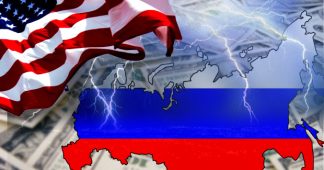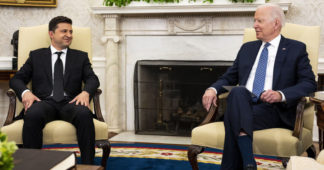His announcement to step up military involvement in Europe reflects his choice of war over peace.
By Stephen Kinzer*
July 11, 2022
The United States is sinking its flag deeper into European soil. President Biden announced late last month that the American military will soon open a “permanent base” in Poland, deploy two squadrons of F-35 fighter jets to Britain, send more warships to our sprawling base in Spain, and increase our troop strength in Romania, Latvia, Lithuania, and Estonia. Instead of promoting diplomacy that could lead to peace, he chose a course guaranteed to increase tensions with Russia at a moment when they are already approaching an all-time high. This brings us one step closer to direct confrontation with another nuclear-armed power.
Biden and other promoters of this policy — a group that includes virtually everyone in Washington — say it is necessary to counter Russian aggression in Ukraine. In fact, it will have little effect in Ukraine. The true purpose of this American buildup is to threaten and intimidate Russia.
For complex reasons that are as much psychological as political, many Americans have come to regard Russia as a font of evil. Many in Washington dream of destroying Russia utterly and forever — stripping it of all power and then perhaps breaking it up into smaller states that would submit to American influence.
For American strategic planners, this war has little to do with Ukraine. They see it as a battering ram against Russia. Since saving Ukrainian lives is not their priority, they view diplomacy as an enemy. Negotiation would inevitably give Russia at least some of what it wants. Russia’s war with Ukraine, on the other hand, holds out the delicious prospect of bringing Russia to its knees. That’s why Congress voted to send Ukraine billions of dollars in weaponry, and why President Biden asserted when making his announcement that rather than send diplomats to the crisis zone, he prefers “stepping up” US military involvement there.
Outlines of what will probably be the peace settlement in Ukraine are already clear. Russia will withdraw its army, eastern regions of Ukraine will be guaranteed autonomy, and Ukraine will agree to keep Western troops out of its territory. Such a peace, however, would end the dream of inflicting a “strategic defeat” on Russia. That is why many in Washington consider it anathema — and why Secretary of State Antony Blinken refused to meet his Russian counterpart when both were at a summit in Bali last week.
An obsession with crushing Russia lies behind Washington’s passionate embrace of the Ukrainian cause. But there is another, more cosmic reason. We are seeing a textbook example of what geo-strategists call the classic security dilemma. One country takes steps to secure itself, but others see those steps as preparation for war. They respond with buildups of their own. Fears, accusations, and demonizing propaganda intensify until fighting breaks out.
This syndrome has led to countless wars. World War I is just one example. Germany began strengthening its navy to protect trade routes and overseas colonies. Britain, determined to “rule the waves,” took this as a threat and began producing radically more destructive warships. Germany presumed it was the intended target of those warships, and began building its own. The competition became so intense that it took only a single spark, an assassination in Bosnia, to set off the conflagration.
The same cascade of military pride and ambition — the same inability to see things from the other side’s point of view — led to the Ukraine war. Democrats and Republicans alike insist that we only ever wanted freedom for Ukraine, that we offered to bring it into the NATO military alliance in 2008 to guarantee that freedom, that we helped depose its Russia-friendly government in 2014 because it was corrupt, and that we are sending tens of billions of dollars in weaponry to Ukraine only to help it defend itself against aggression.
Russians see things quite differently: America is fiercely dedicated to destroying Russia; it is increasing troop strength in Europe to prepare for a future assault; and if Russia doesn’t stop this tide in Ukraine, it will sooner or later find itself defending Moscow against a US-led attack.
It’s not necessary to decide which of these versions is right, only to recognize that both exist. Like many Americans, Biden sees Russia through a lens at least as distorted as the one through which Russia views us. His latest step reflects his choice of war over peace — or as he might put it, his belief that peace can best be achieved through war. That will haunt the world long after the Ukraine conflict ends.
* Stephen Kinzer is a senior fellow at the Watson Institute for International and Public Affairs at Brown University.
We remind our readers that publication of articles on our site does not mean that we agree with what is written. Our policy is to publish anything which we consider of interest, so as to assist our readers in forming their opinions. Sometimes we even publish articles with which we totally disagree, since we believe it is important for our readers to be informed on as wide a spectrum of views as possible.











